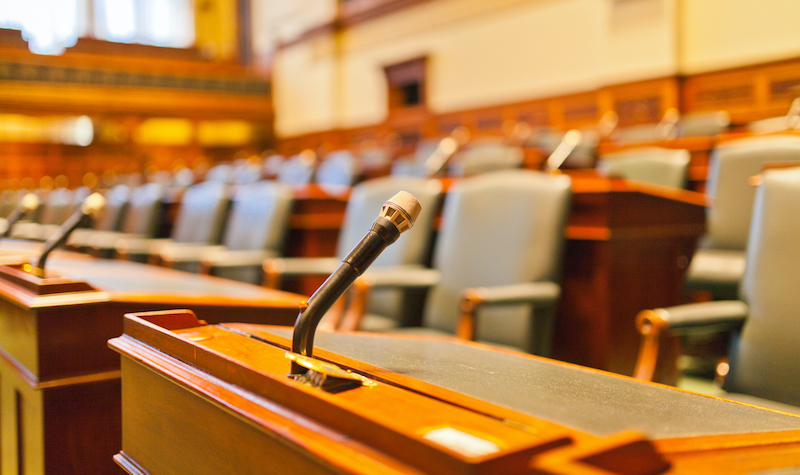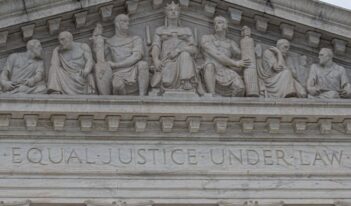
Scholar argues that banning mandatory bar associations would be a public boon.
The COVID-19 pandemic has upended the bar examination—a legal competency test—for new lawyers. Many states’ plans to administer the exam have been postponed, leaving the practicing status of many recent law graduates in limbo.
But the bar examination—notoriously expensive both for its registration fee and corresponding preparation classes—is not the end of many lawyers’ professional financial obligations. Lawyers often have to pay annual dues to a state bar association, which is different from admission to the bar, to practice. In some states, such as Pennsylvania, bar associations are voluntary, which means practicing attorneys are not forced to pay membership dues. Other states, such as Michigan, have mandatory bar associations, to which practicing attorneys must pay membership dues, even if they do not directly take advantage of any membership benefits or opportunities.
In a recent article, Leslie C. Levin of the University of Connecticut School of Law discusses the future of mandatory bar associations in light of a 2018 U.S. Supreme Court decision. Levin observes that lawyers, who often oppose mandatory bar associations, might have the most to lose if mandatory bar associations are ruled unconstitutional because they “enable lawyers to lobby for lawyers’ interests even more effectively than voluntary bars because of their size, stature, and financial resources.”
Mandatory bar associations have come under fire as some lawyers claim they are forced to contribute financially to an association that may be doing more than just regulating their profession. Critics maintain that a bar association that engages in a political activity, for instance, violates the rights of lawyers who cannot opt out of paying dues to the organization.
In the case of Janus v. AFCSME, the Supreme Court held that public employees could not be forced to pay union fees if the employees were not members of the union. The Court ruled that forcing nonmembers to pay violated their free speech rights. In reaching its conclusion, the Court determined that the state could not force public employees to pay into a labor union when the state could maintain “labor peace” through means that do not restrict individual liberties.
Levin claims the question is not if, but when, the Court will apply the reasoning in Janus to declare that mandatory state bar associations violate lawyers’ First Amendment rights.
Bar associations were originally formed in the 1870s to promote the legal industry, Levin explains. But the associations soon shifted to establishing professional standards that all lawyers were expected to follow. The problem, she notes, was that these fledgling bar associations wielded little regulatory power, and membership rates were as low as 10 percent in some states. The move away from voluntary bar associations began when a lawyer named Herbert Harley campaigned about the alleged benefits of mandatory associations.
Harley and other mandatory bar proponents believed that mandatory organizations would be more powerful and cohesive than voluntary bars. This structure could allow mandatory bars to raise the barriers to entering the legal profession, allowing lawyers to charge higher rates and protecting their own economic interests. At the same time, mandatory bar proponents argued that the public would benefit by the bars’ high legal standards which regulated lawyers and disciplined members who failed their professional responsibilities.
Harley was largely successful, and Levin notes that today there are 31 mandatory bar associations. Although Harley championed how the public would benefit from mandatory bars, Levin argues that lawyers have been the biggest winners of Harley’s crusade.
One difference between mandatory bars and voluntary bars is power. Mandatory bars are able to compel membership dues, which often gives these mandatory associations greater financial strength than voluntary ones. Although the practice varies by state, Levin claims that mandatory bars typically enjoy a closer connection to their respective state legislatures and can draft rules to regulate lawyers.
Levin details how mandatory bar associations benefit lawyers in several ways. Because of the considerable power they wield, these mandatory professional groups can steer certain regulatory proposals away from consideration and develop their own admission and disciplinary rules. They can also ease the burden on state supreme courts, which might otherwise be forced to regulate lawyers.
Levin cautions, however, that these benefits to lawyers may come at the expense of the public. She states that since mandatory bar associations are often seen as state agencies or “instrumentalities of the judiciary,” their proposed regulations may receive deferential treatment from state courts.
The Supreme Court will likely hold mandatory bars unconstitutional when the issue comes before them, Levin predicts. Following the methodology applied in Janus, she demonstrates that most, if not all, of the functions of mandatory bar associations can be achieved through other methods that do not infringe on individual lawyers’ First Amendment rights.
Levin provides several reasons why she thinks mandatory bars will fail. First, as some states have already done, the regulatory functions of a mandatory bar can be carved out and assigned to another state entity. Second, mandatory bars likely do not benefit the public more than voluntary bars, and no evidence exists showing that states with voluntary bars have lower quality lawyers. Finally, voluntary bar associations can strengthen their financial resources in ways that do not restrict lawyers’ First Amendment freedoms—such as collecting lawyer registration fees and bar application fees.
In addition, she notes that although mandatory bar associations claim to be in the public’s interest, some states with mandatory bars have the “most underfunded and understaffed lawyer discipline systems” in the country.
The public, Levin concludes, will benefit when mandatory bars are deemed unconstitutional. Without mandatory bar associations, lawyers might be more inclined to join specialty bars—associations that focus on particular practice areas—which could strengthen the profession. And courts that no longer defer to mandatory bars could more fully incorporate the public’s perspective when drafting rules.
But until the Supreme Court strikes down mandatory bars, many lawyers will have to keep on paying their annual bar dues.



